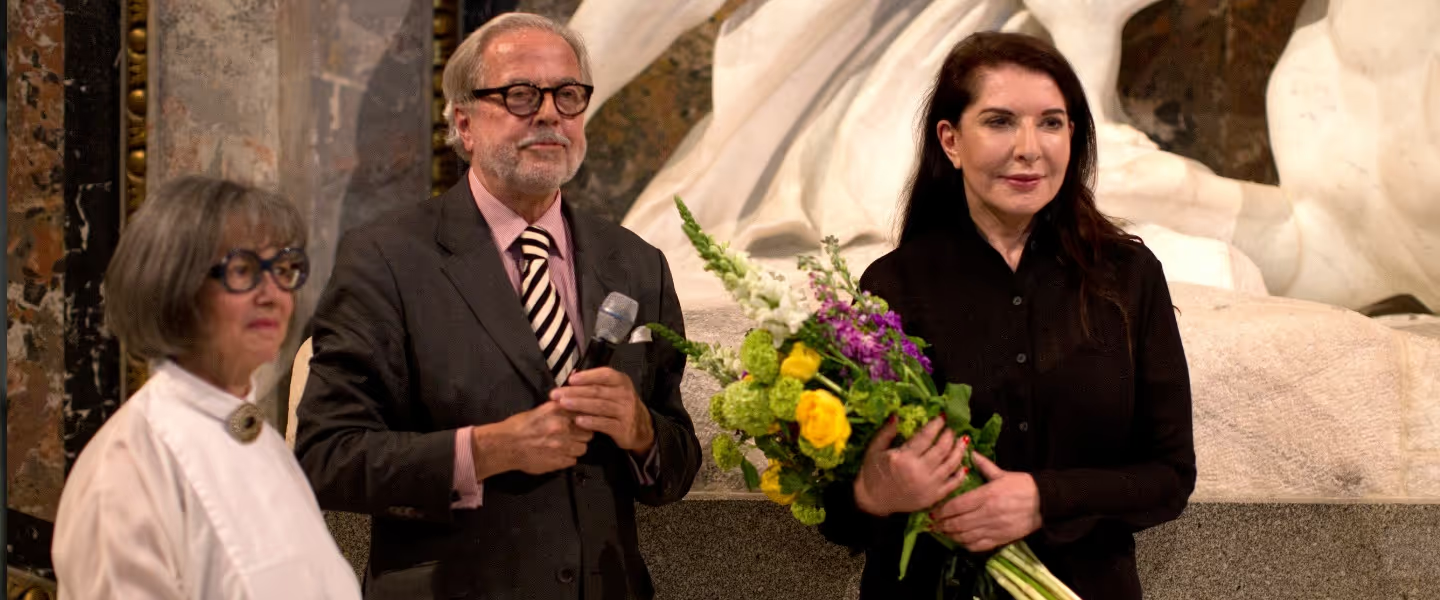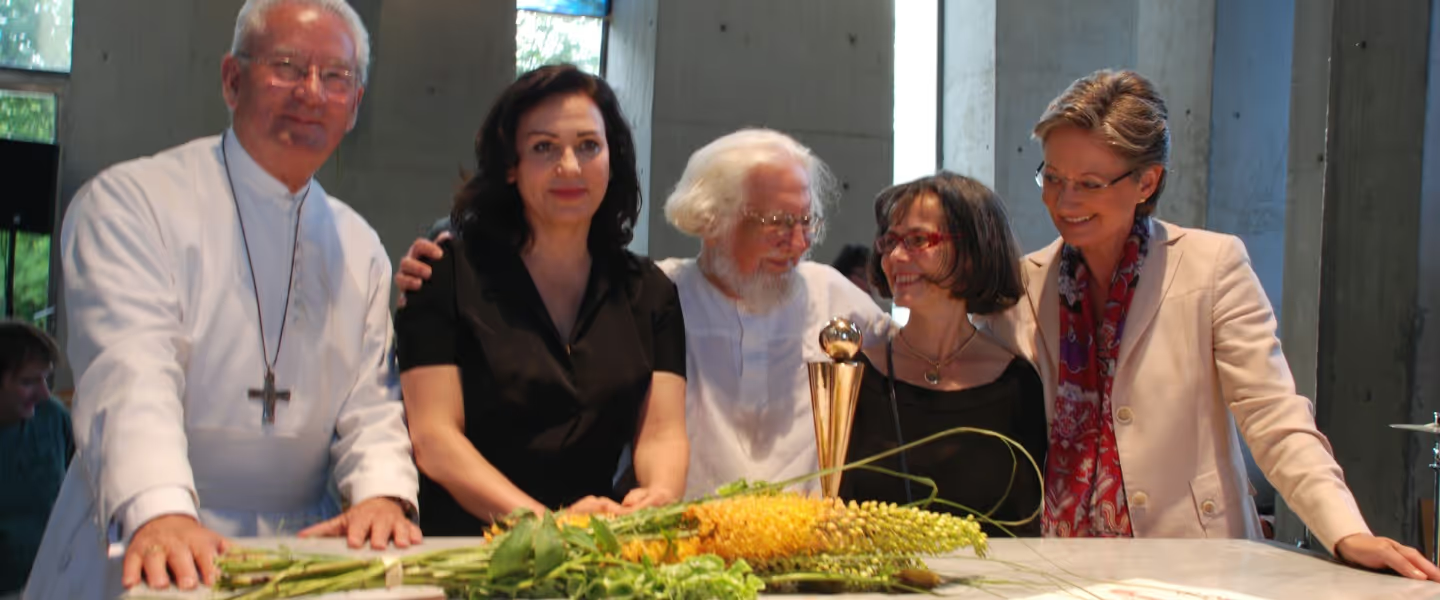
GLOBART Award
Von 1998 bis 2019 zeichnete GLOBART Persönlichkeiten aus, die durch ihr Wirken Vorbilder und HoffnungsträgerInnen für die Gesellschaft und die nächsten Generationen sind.
Zu jeder Zeit waren und sind Vorbilder wichtig. Sie begeistern, sind Leitfiguren, prägen unser kulturelles Erbe. Mit dem GLOBART AWARD sollen Menschen ermutigt werden, authentisch ihren Weg zu gehen. Der Preis ist zugleich Dank und Würdigung für das künstlerische und gesellschaftspolitische Engagement.
Zu den PreisträgerInnen zählen Lord Yehudi Menuhin, Hans Küng, Václav Havel, Ernesto Cardenal, Riccardo Muti, Freda Meissner-Blau, José Antonio Abreu, Tino Sehgal, Michael Haneke, Jeffrey Sachs und Marina Abramovic.
Der Award wurde von Josef Kaiser, Mitarbeiter des Künstlers Adolf Frohner, entworfen. In ihrer ausdrucksstarken Einfachheit ist die Figur ein Symbol für Spiritualität, Kreativität und soziales Bewusstsein.
2019 Carola Rackete

Carola Rackete (geboren 1988) erlangte internationale Bekanntheit als Kapitänin der Sea-Watch 3, als sie 2019 im Mittelmeerraum Katastrophen- und humanitäre Hilfe leistete. Rackete studierte Nautik an der Jade Hochschule in Elsfleth, Deutschland (2007-2011) und Naturschutzmanagement an der Edge Hill University, Ormskirk, Lancashire, England (2015-2018). Von August 2011 bis Oktober 2013 nautische Offizierin für das Alfred-Wegener-Institut Helmholtz-Zentrum für Polar- und Meeresforschung sowie auf Kreuzfahrtschiffen, für Greenpeace (März 2015 – September 2015) und British Antarctic Survey (Januar 2016 – April 2017). 2018 arbeitete Rackete für drei Monate als Natur Guide in der Hocharktis, wo sie zum Naturschutz und über die Auswirkungen des ökologischen Wandels lehrte. Daneben engagiert sich Rackete seit 2016 als Freiwillige für den Verein Sea-Watch e.V., im Europäischen Freiwilligendienst-Programm im UN-Kulturerbe-Park Volcanoes Kamchatka, Russland und als Tierschützerin für LPO France. Seit 2018 reist Rackete durch China, postsowjetische und polare Gebiete, wo sie selbstständig eine sozial-ökologische Studie zum Naturschutz durchführt. Ihr derzeitiges Ziel ist, die Zukunft des Natur- und Umweltschutz in verschiedenen Kulturen und Kontinenten zu erforschen.
2018 – Marina Abramović

Marina Abramovic, die bedeutendste Performance-Künstlerin der Gegenwart, hat die Kunstwelt radikal verändert. Millionen von Menschen berührte sie mit der Kraft ihres Schweigens. In der Kuppelhalle des Kunsthistorischen Museums Wien wurde sie 2018 mit Globart Award ausgezeichnet.
Seit Beginn ihrer Karriere in Belgrad in den frühen 1970er Jahren ist Marina Abramovic Pionierin der Performance Art und hat einige der wichtigsten frühen Werke geschaffen. Der Körper war immer beides – ihr Subjekt und Medium. Ihre physischen und mentalen Grenzen erforschend, hat sie auf ihrer Suche nach emotionaler und spiritueller Transformation Schmerzen, Erschöpfung und Gefahr ertragen. 2010 hatte Abramović ihre erste große U.S. Retrospektive und gleichzeitig fand ihre 700 Stunden Performance “The Artist is Present” im Museum of Modern Art in New York statt. 2014 vervollständigte sie die drei Monate lang dauernde Performance “512 Stunden” in der Serpentine Gallery in London. Abramović gründete das Marina Abramović Institute (MAI), eine Plattform für immaterielle und langfristige Arbeit für neue Möglichkeiten der Zusammenarbeit zwischen Denkern aller Bereiche. Das Institut hat 2016 seine bisher vollständigste Form der Zusammenarbeit mit NEON in “As One”, Benaki Museum, Athen, beheimatet. Ihre jüngste Publikation “Walk Through Walls”: Erinnerungen, veröffentlicht von Crown Archetype am 25. Oktober 2016. Ihre Retrospektive, “The Cleaner” wurde erstmals im Moderna Museet, Stockholm im Februar 2017 gezeigt und tourt zum Louisiana Museum für moderne Kunst in Dänemark, Henie Onstad Kunstsenter in Oslo, Bundeskunsthalle in Bonn und Palazzo Strozzi in Florenz.
2017 – Jeffrey Sachs

Mit dem GLOBART Award 2017 wurde Ökonom Jeffrey D. Sachs für sein Engagement als internationaler Vordenker für eine globale ökoszioale Marktwirtschaft ausgezeichnet. Sachs setzt sich für eine gerechtere Ressourcenaufteilung ein. Die Verleihung fand bewusst im Zentrum der Geldpolitik in der Österreichischen Nationalbank statt.
Geboren 1954 in Detroit. Seit 2002 Leiter des Earth Institute an der Columbia Universität und einer der weltbekanntesten Ökonomen, federführend in nachhaltiger Entwicklung, UN-Berater, Bestseller-Autor – The End of Poverty (2005), Common Wealth: Economics for a Crowded Planet (2008) und The Price of Civilization (2011), sowie Kolumnist für Zeitungen und Zeitschriften in mehr als 100 Ländern. Neben unzähligen gewonnen Preisen und Auszeichnungen wurde er vom Time Magazin zweimal zu den 100 einflussreichsten Menschen weltweit gewählt und die New York Times beschreibt ihn “als den wahrscheinlich wichtigsten Ökonomen weltweit”. Professor Sachs wird als einer der einflussreichsten Experten für wirtschaftliche Entwicklung, globale Makroökonomie und im Kampf gegen Armut angesehen. Er ist Sonderberater des UN Generalsekretärs António Guterres für die Durchsetzung der Sustainable Development Goals und war davor ebenfalls Berater in der Ausformulierung der Millennium Development Goals wie der Sustainable Development Goals. Zurzeit ist er Direktor des UN Sustainable Development Solutions Network und Kommissar der ITU/UNESCO Broadband Commission for Development.
2016 – Michael Haneke

Mit der Verleihung des GLOBART Award 2016 verneigen wir uns vor dem Künstler und Menschen Michael Haneke, der meisterhaft unseren Blick auf Wirklichkeit(en), die uns umgeben, lenkt.
Michael Haneke wurde 1942 in München geboren. Als Sohn zweier Schauspieler wuchs er in Wien auf und studierte dort nach dem Schulabschluss Philosophie, Psychologie und Theaterwissenschaften. Nach vorzeitigem Abbruch des Studiums ging Haneke 1967 nach Baden-Baden, um als Fernsehdramaturg beim Südwestfunk zu arbeiten. 1989 gab Haneke mit “Der Siebente Kontinent” sein Debüt als Kinoregisseur. Mit “Die Klavierspielerin” (2000), einer Verfilmung der literarischen Vorlage von Elfriede Jelinek, gelang Haneke endgültig der internationale Durchbruch, gefolgt von weiteren Meisterwerken wie “Das weiße Band” und “Liebe”, wofür er einen Oscar erhielt.
2015 – Tino Sehgal
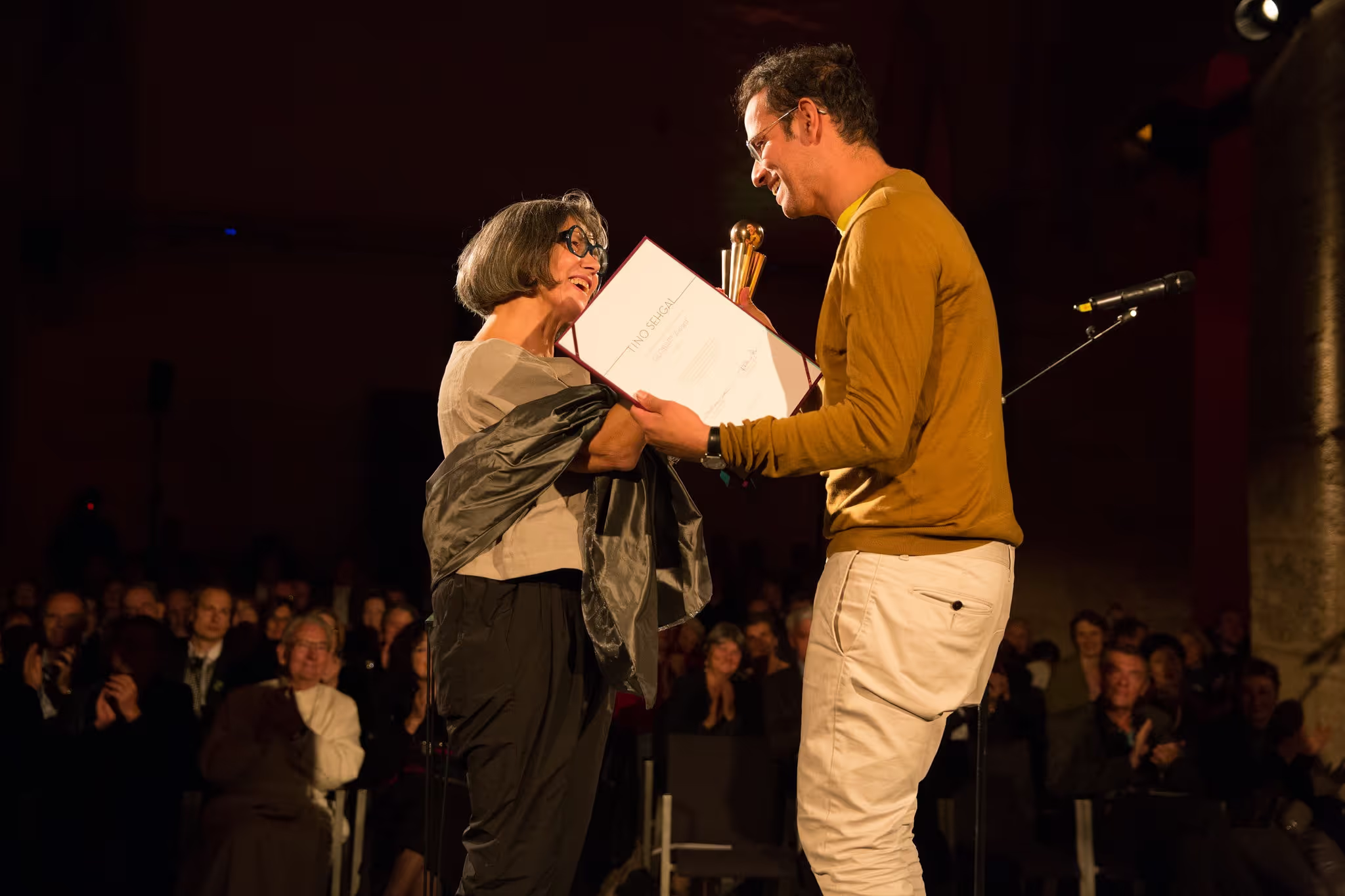
Mit Tino Sehgal zeichnet GLOBART einen der innovativsten Künstler der Gegenwart mit dem GLOBART AWARD 2015 aus. Er fügt der Welt keine neuen Objekte hinzu, sondern ermöglicht Begegnung von Menschen, die bewegt, begeistert, zum Nachdenken und Umdenken anregt. Für seine Suche nach Wahrhaftigkeit, sein Engagement für Nachhaltigkeit machen ihn zum Vorbild und Hoffnungsträger der Generation Y.
Geboren 1976 in London. Künstler. Lebt und arbeitet in Berlin. Studium der Volkswirtschaftslehre und des Tanzes an der Humboldt-Universität in Berlin sowie an der Folkwang Universität der Künste in Essen. 2013 Leone d’oro, 55. Biennale di Venezia. Einzelausstellungen (Auswahl): A Year at the Stedelijk: Tino Sehgal, Stedelijk Museum Amsterdam; The Unilever Series – Tino Sehgal, Tate Modern, Turbine Hall, London; Tino Sehgal, Solomon Guggenheim Museum, New York. Gruppenausstellungen (Auswahl): Turner Prize 2013, Ebrington; The Encyclopedic Palace, 55. Biennale di Venezia, Venedig; dOCUMENTA (13), Kassel. Sehgal arbeitet an einer radikalen Neubestimmung der Kunst und ihrer Erfahrung, indem er Situationen anstatt materieller Objekte konstruiert. In seinen Arbeiten untersucht er soziale Prozesse, kulturelle Konventionen und Rollenverteilungen und bestimmt dabei nicht nur die Kunstproduktion selbst neu, sondern stellt fundamentale Werte unseres Sozialsystems wie Nachhaltigkeit, Originalität und Eigentum auf den Prüfstand.
2012 – John Hunter

John Hunter wurde 2012 für das von ihm entwickelte World Peace Game mit dem Globart Award ausgezeichnet. Ein Spiel, bei dem Kinder nicht nur versuchen die großen Probleme der Welt zu lösen sondern auch lernen, was in dieser Welt von extremer Wichtigkeit ist: komplexe Probleme erkennen, Informationen filtern, Verantwortung übernehmen, im Team arbeiten, schnelle Entscheidungen treffen – doch auch diese wieder revidieren, wenn sie ins Nichts führen oder auch einmal zu scheitern.
Der renommierte Pädagoge überzeugte mit seinen innovativen Ideen, mit seiner liebevollen und wertschätzenden Arbeit mit Kindern und mit seinem Engagement für jene Ideale, denen sein Vorbild Martin Luther King sein Leben widmete: Gewaltlosigkeit, Menschenwürde und Friede.
2009 – Ernesto Cardenal
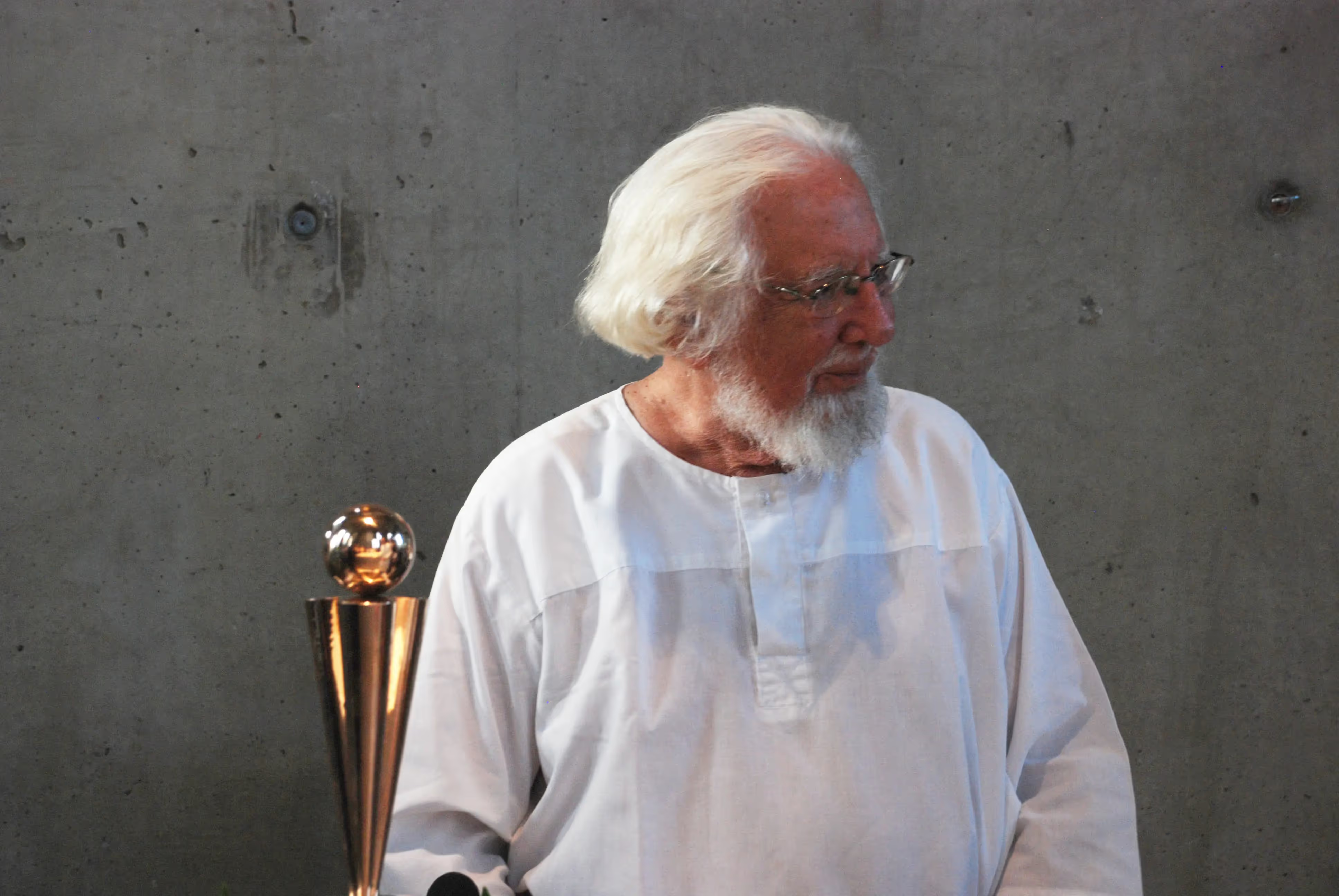
Ernesto Cardenal wurde 2009 mit dem Globart Award für sein engagiertes politisches Eintreten als Befreiungstheologe, für seinen Einsatz als Kulturminister für die Armen, Entrechteten und an den Rand Gedrängten, für sein künstlerisches Schaffen ausgezeichnet. Er ist einer der bedeutendsten Lyriker Lateinamerikas – zugleich hat er die Entwicklung des Kontinents als Literat, Theologe und Politiker wesentlich beeinflusst.
Als Schriftsteller, Priester und Politiker hatte Ernesto Cardenal keine Furcht, anzuecken. In Nicaragua kritisierte er zuletzt auch seine alten Sandinista-Genossen. 1925 in Cartagena, Nicaragua, geboren, war Carnedal Novize im Trappistenkloster Gethsemani (USA). Dort übte der Dichter-Mönch Thomas Merton hatte großen Einfluss auf ihn aus. In den 1970igerJahren schloss sich Cardenal der sandinistischen Revolution an, war aktiv im Widerstand gegen den Diktator Anastasio Somoza. Bereits 1966 hat er auf der Insel Solentiname eine an radikal- urchristlichen Idealen orientierte Gemeinschaft gegründet. Entegegen kirchenrechtlichen Vorgaben trat er nach dem Sturz des Somoza-Regimes 1979 mit drei weiteren Priestern als Minister in die sandinistische Revolutionsregierung von Daniel Ortega ein. 1985 wurde er von Papst Johannes Paul II. deswegen vom Priesteramt suspendiert, erst 2019 von Papst Franziskus rehabilitiert. Cardenals "Psalmen" und "Evangelium der Bauern von Solentiname" zählen zu den bedeutenden Werken lateinamerikanischer Poesie. 1980 erhielt Ernesto Dichter den Friedenspreis des deutschen Buchhandels.
2007 – Riccardo Muti

Der Dirigent Riccardo Muti wurde 2007 für sein jahrzehntelanges künstlerisches Wirken und sein sozialpolitisches Engagement - sein Projekt "Le Vie dell'Amicizia" - in deren Rahmen er jährlich an einem krisenbetroffenen Ort gastiert, mit dem GLOBArt Award ausgezeichnet. Bisherige Stationen waren etwa Beirut, Jerusalem, Moskau, Istanbul oder Kairo. Im Rahmen des von Muti gegründeten "Cherubini-Jugendorchesters" arbeitet der Dirigent mit jungen italienischen Musikern zusammen und fördere so aktiv die Verständigung in einer gemeinsamen Sprache: der Musik.
Riccardo Muti, einer der führenden Dirigenten der Gegenwart studierte am Conservatorio di Musica San Pietro a Majella in Neapel und am Verdi-Konservatorium in Mailand. Er ist Chefdirigent des Chicago Symphony Orchestra seit 2010. 1969 bis 1981 war er Chefdirigent des Maggio Musicale in Florenz, 1973 bis 1982 des New Philharmonia Orchestra in London und 1980 bis 1992 Chefdirigent und Musikalischer Direktor des Philadelphia Orchestra, seit 1992 Ehrendirigent, 1986 bis 2005 Musikalischer Direktor der Mailänder Scala und 1988 bis 2005 Chefdirigent der Philharmonie der Mailänder Scala. Tourneen mit den großen internationalen Orchestern.Für sein künstlerisches Wirken und sozialpolitisches Engagement im Rahmen der Konzertreihe “Le Vie dell’Amicizia” (“Wege der Freundschaft”) 2007 mit dem GLOBART Award ausgezeichnet. Venezolanischer Komponist, Ökonom, Politiker, Erzieher, Aktivist. Gründer des größten musikalischen Projektes in Venezuela “Sinfónica de la Juventud Venezolana Simón Bolívar”. 2006 mit dem GLOBART Award ausgezeichnet.
2006 – José Antonio Abreu

José Antonio Abreu wurde vor der Opernvorstellung „The Flowering Tree“ von John Adams, für seine Bildungsinitiative "El Sistema" mit dem GLOBArt Award im Museumsquartier geehrt. Laudatoren waren der Regisseur Peter Sellers und Dirigenten Sir Simon Rattle. Mit der Gründung des venezolanischen Musikwunders "El Sistema" -Venezuelas Jugendorchester - holt er die Kinder weg von der Straße, weg von den Drogen. „Wer Sport betreibt oder musiziert, nimmt keine Drogen.“
Tropeten gegen Drogen
José Antonio Abreu, gelernter Volkswirt, der seinen sicheren Posten in der Zentralbank aufgab, um sich ganz seinem Lebensprojekt widmen zu können, ist für seine Arbeit bereits mit dem Alternativen Nobelpreis ausgezeichnet worden. Die Interamerikanische Entwicklungsbank hat die Musikschulen kürzlich als bestes Sozialprojekt ganz Lateinamerikas ausgewählt und steuert auch regelmäßig zur Grundfinanzierung bei.Nicht weniger als 90 Musikschulen sind in den letzten 30 Jahren landesweit entstanden. 15.000 Lehrerinnen und Lehrer kümmern sich um eine Viertelmillion Musikschüler. „Bei uns haben alle Talent für die Musik. Ich weiß von keinem, der wegen mangelnder Begabung aufgegeben hätte“, versichert der Maestro, der sein Modell längst in ganz Lateinamerika popularisiert hat.
2005 – Freda Meissner-Blau
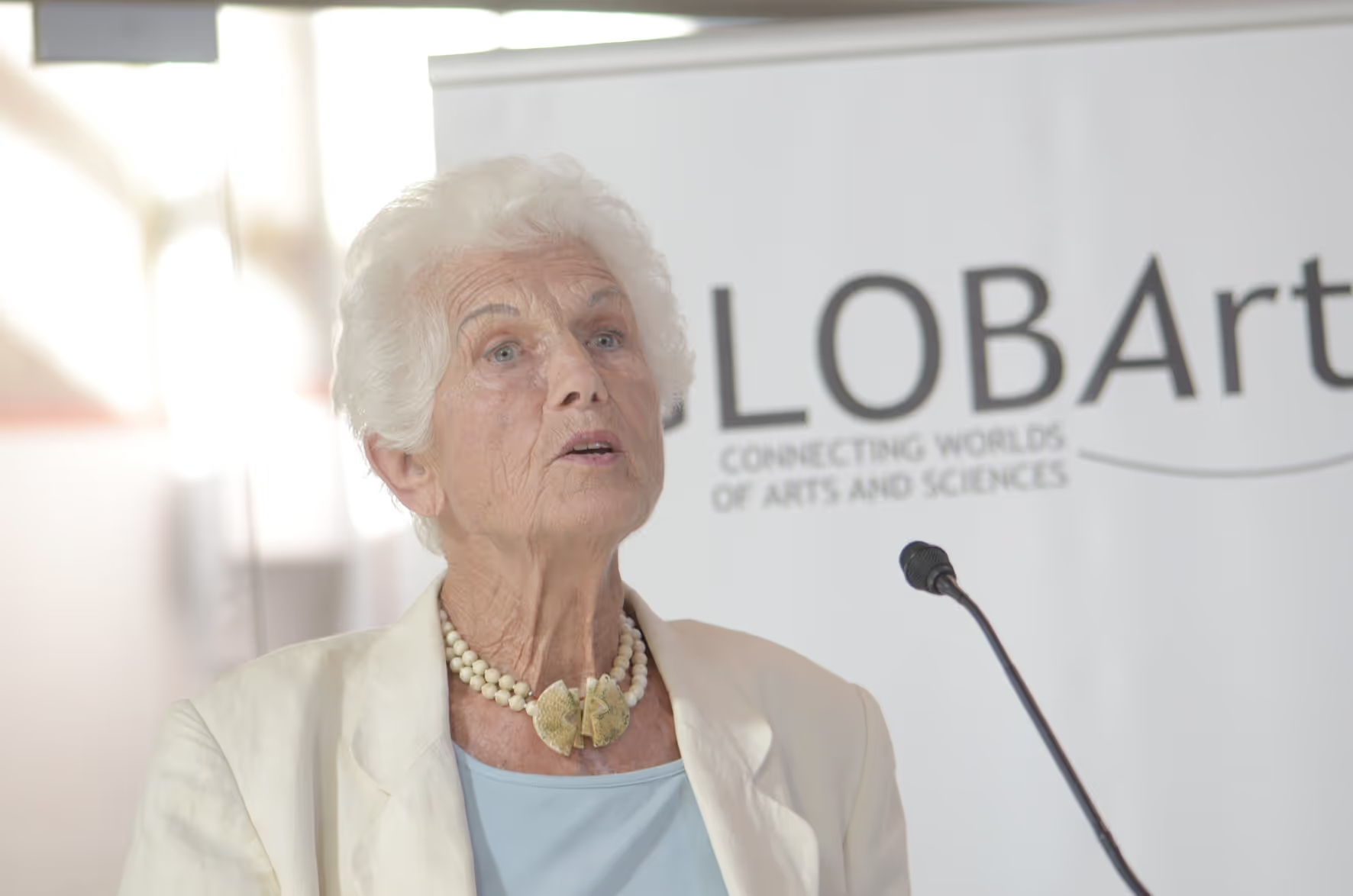
Freda Meissner-Blau, Journalistin und Mitbegründerin der Grünen wurde für ihr Wirken zum Schutz der Umwelt und ihr mutiges öffentliches Eintreten für Menschenrechte, Menschenwürde, Gerechtigkeit und Frieden 2005 mit dem GLOBART Award ausgezeichnet. Laudatorin Christine von Weizsäcker: "Für Deine frühe, klare Sicht und Deine klaren Worte wirst Du gelobt."
2005 – Franz Küberl

Langjähriger Präsident der “Caritas Österreich” (1995-2013). Mitglied des ORF-Publikumsrats und des ORF-Stiftungsrats, Stifter der “Katholischen Medien Verein Privatstiftung”.
2004 – Dom Erwin Kräutler

Römisch-Katholischer Ordensgeistlicher, Missionar. Von 1981 bis 2015 Bischof und Prälat von Xingu, der flächenmäßig größten Diözese Brasiliens. 2010 für seinen Einsatz für die Menschenrechte der Indios und die Erhaltung des tropischen Regenwaldes im Amazonas-Gebiet mit dem alternativen Nobelpreis und 2004 mit dem GLOBART Award ausgezeichnet.
2003 – Václav Havel

Wurde für sein politisches Engagement und für sein künstlerisches Schaffen mit dem GLOBART Award ausgezeichnet. Tschechischer Dramaturg, Essayist, Menschenrechtler und Politiker. 1989 bis 1992 letzter Staatspräsident der Tschechoslowakei, 1993 bis 2003 erstes Staatsoberhaupt der Tschechischen Republik. Mitglied in der Schriftstellergemeinde “Obec spisovatelů” und Ehrenmitglied im “Club of Rome”. 2003 mit dem GLOBART Award ausgezeichnet.
2000 – Hans Küng

Für sein friedensstiftendes Projekt “Weltethos” wurde er 2000 mit dem GLOBART Award ausgezeichnet.
"Eine Weltepoche, die anders als jede frühere geprägt ist durch Weltpolitik, Welttechnologie, Weltwirtschaft und Weltzivilisation, bedarf eines Weltethos.“ - Hans Küng
Hans Küng, geboren 1928 in Sursee/Schweiz, ist Professor Emeritus für Ökumenische Theologie an der Universität Tübingen und Ehrenpräsident der Stiftung Weltethos. Er gilt als einer der universalen Denker unserer Zeit. Sein Werk liegt im Piper Verlag vor. Zuletzt erschienen von ihm „Was ich glaube“ – sein persönlichstes Buch –, „Erlebte Menschlichkeit“, der dritte Band seiner Memoiren, sowie „Sieben Päpste“.
2000 – Fariborz Sahba

Der iranisch-kanadische Architekt Fariborz Sahba wurde für seine architektonische Meisterleistung - dem Bau des - "Lotustempel"mit dem GLOBART Award ausgezeichnet. Er entwarf die Terrassen am Schrein des Bab und das Besucherzentrum im Bahai-Weltzentrum in Haifa, das Haus der Andacht in Neu-Delhi, das als Lotustempel bekannt ist, sowie die iranische Botschaft in Peking, Volksrepublik China. Er studierte Architektur an der Universität Teheran bis 1972.
Als sich nach der Islamischen Revolution von 1979 die Verfolgung der Bahai verschärfte, musste er sein Heimatland verlassen und siedelte nach Vancouver in Kanada um.
1998 – Lord Yehudi Menuhin

Lord Yehudi Menuhin erhielt die Auszeichnung für sein Lebenswerk im Dienste im Rahmen eines Festaktes von LH Dr. Erwin Pröll.
Lord Yehudi Menuhin ist 1916 in New York geboren. Er wuchs auf in San Francisco. Yehudin erhielt mit vier Jahren den ersten Geigenunterricht bei Louis Persinger. Bereits 1925 gab Menuhin sein erstes Solokonzert, weitere folgten 1926 in New York. Seine Karriere als Konzertgeiger führte Menuhin anschließend um die ganze Welt. Er zählt zu den größten Violinvirtuosen des 20. Jahrhunderts. Lord Yehudi Menuhin verstarb 1999 in Berlin.
GLOBART INNOVATION AWARD PreisträgerInnen
2005 – Katalin Zanin

"Ich bin OK" - Studium der Psychologie und der Theaterwissenschaften an der Universität Wien und des Lehrgangs Kulturmanagement. 1979 Gründung des Vereins “Ich bin O.K.”, von 1990 bis 1995 Geschäftsführerin der “Aktion Mensch” für die Industriellen Vereinigung. Leitung des Kultur- und Bildungsvereins “Ich bin O.K.”, nunmehr dessen Integrationsbotschafterin und Ehrenpräsidentin. Erhielt 2005 für ihr Projekt “Ich bin O.K.” den GLOBART Innovation Award.
2004 – Timna Brauer & Elias Meiri

"Voices for Peace" - Geboren in Wien, verbringt Timna Brauer ihre ersten Lebensjahre in Paris. Matura am Wiener Lycée Francais, Gitarre, Klavier und Gesangsausbildung (Wiener Konservatorium). Anschließend Studium der Musikwissenschaften an der Pariser Sorbonne und Meisterkurse in Klassik. Sie wurde erfolgreich in Ihrer Musikkarriere.Gemeinsam mit dem israelischen Jazz-Pianisten Elias Meiri gründet Timna Brauer 1985 ein Ensemble, das bis heute regelmässig international auftritt.Elias Meiri ist gebürtiger Israeli, und spielt seit dem fünften Lebensjahr Klavier. Unterstützt durch sein absolutes Gehör beherrscht er schon im frühen Alter die Improvisationskunst.Er besucht das Musikgymnasium Talma Yalin in Tel-Aviv und absolviert sein Studium im Berklee College of Music in Boston. Einige Jahre spielt er mit diversen Jazzgrößen wie Dizzie Gillespie, Dave Liebmann und Steve Großmann in New York, bevor er sich 1988 in Europa niederlässt.
2001 – Wilhelm Barthlott

Mit Wilhelm Barthlott wurde einer der bedeutendsten Biodiversitätsforscher und Biontiker für seine wissenschaftliche Arbeit mit dem GLOBART Innovationpreis ausgezeichnet. Seine Entwicklung des Lotus-Efekts führte zu einem Paradigmenwechsel in weiten Bereichen der Materialwissenschaften und ermöglichten die Entwicklung superhydrophober biomimetischer Oberflächen.
2001 – Shamil Fattakhov

"Promoting Positive Messages Through The Media" - der russische Regisseur Shamil Fattakhov wurde für das von ihm entwickelte Theaterprojekt "Stop & Act" - eine neue Möglichkeit der Konfliktbewältigung mit dem GLOBART Innovation Award ausgezeichnet.
Programm

In Partnerschaft mit:
Förderer:
In Kooperation mit:
Sponsoren
Kooperationen
Sponsoren fürs Stipendienprogramm
Medienpartner
Jetzt Mitglied werden oder Mitgliedschaft schenken
Globart-Mitglieder profitieren vom Globart-Netzwerk und von vergünstigten Teilnahmegebühren bei allen Veranstaltungen.


